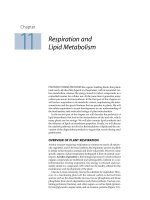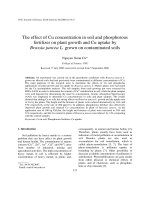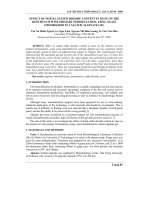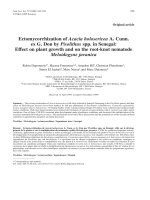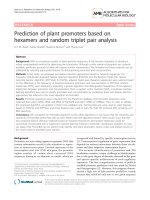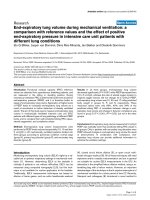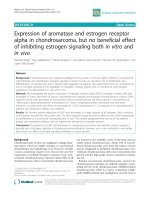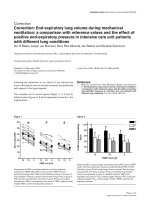Effect of plant growth regulators on growth and lipid accumulation of microalgal Haematococcus Pluvialis flotow in two-stage culture
Bạn đang xem bản rút gọn của tài liệu. Xem và tải ngay bản đầy đủ của tài liệu tại đây (2.77 MB, 8 trang )
Journal of Biotechnology 16(4): 679-686, 2018
EFFECT OF PLANT GROWTH REGULATORS ON GROWTH AND LIPID
ACCUMULATION OF MICROALGAL HAEMATOCOCCUS PLUVIALIS FLOTOW IN
TWO-STAGE CULTURE
Nguyen Tran Dong Phuong1,2, *, Le Huyen Ai Thuy2, Bui Trang Viet1
1
2
University of Science, Vietnam National University Ho Chi Minh City
Ho Chi Minh City Open University
*
To whom correspondence should be addressed. E-mail:
Received: 20.7.2018
Accepted: 25.11.2018
SUMMARY
Haematococcus pluvialis cells were cultured in aerated liquid Bold’s Basal medium in two-stage (initial
stage during in 7 weeks for increased biomass growth and second stage during in 3 weeks for increased lipid
accumulation) with different volumes 250 mL, 10 L, and 1,000 L. With a volume of 250 mL, the medium was
supplied with benzyl adenine (BA), indole-3-acetic acid (IAA) or gibberellic acid (GA3) at concentration from
0.1 - 0.2 mg/L in initial stage and IAA or GA3 at concentration from 0.1 - 0.2 mg/L in second stage. After 10
weeks of culture, results showed that supplement of 0.1 mg/L BA in initial stage and 0.125 mg/L IAA in
second stage increased cell density, and microalgal cells had green color with a spherical shape. On the
contrary, supplement of 0.15 mg/L IAA in initial stage and 0.175 mg/L GA3 in second stage increased lipid
accumulation, and microalgal cells had red color with a spherical shape. With a volume of 10 L, the medium
was supplied with 0.1 mg/L BA in initial stage, and treated with separation or combination from 2 - 3 of these
factors (nitrogen starvation, 0.5% NaCl, 4.98 mg/L FeSO4) were applied in second stage. The result showed
that the cultures was treated with nitrogen starvation increased dry biomass and biofuel, but treated with 4.98
mg/L FeSO4 only increased biofuel. With a volume of 1,000 L, microalgal cells were cultured in BB liquid
medium in initial stage, and treated with 4.98 mg/L FeSO4 increased fresh 78.67 mg/mL and dry biomass 2.05
mg/L and total lipid content 28.24 %/ DW.
Keywords: Biofuel, Haematococcus pluvialis Flotow, nitrogen starvation, plant growth regulators, two-stage culture
INTRODUCTION
Nowadays, biofuel, which was considered as
renewable, environment-friendly, safe to use, will
eventually alternate from fossil non-renewable
resources. The development of 4th generation biofuel
production (algae-to-biofuels) based on metabolic
engineering of algae is still in its infancy, due to the
lacking of understanding of microalgal growth,
metabolism and biofuel production processes.
Haematococcus pluvialis is green microalgal, which
is considered as a potential biodiesel feedstock (Lei
et al., 2012). Growth of H. pluvialis significantly
increased under different growth regulators, such as
auxin or combined with cytokinin (Raposo et al.,
2006). Concerning to taxanomy of algae, several
different references indicated the essentially all
known phytohormones detected in concentrations
comparable with their contents in higher plants
(Tarakhovskaya et al., 2007). Plant growth
regulators are not only increasing the growth but also
increasing quantity and quality of fatty acid of
microalgal, which is necessary to biofuel production
(Salama et al., 2014). Previous study indicated that
two-stage culture were used to increase microalgal
biomass in the initial stage and improve the biomass
concentration as well as lipid production in second
stage (Cui et al., 2017).
In our previous study, we successfully identified
the condition of H. pluvialis culture by identification
of different concentration of BA, IAA and GA, which
impacted on growth and lipid accumulation in cells
(Nguyen et al., 2015). In addition, we also established
the molecular method to evaluate the presence of
biotin carboxylase gene (BC) and fatty acyl-acyl
carrier protein thioesterase gene (FATA) on H.
679
Nguyen Tran Dong Phuong et al.
pluvialis (Nguyen et al., 2016). Therefore,
continuously, the aims of current study are to estimate
the effects of different plant growth regulators on the
growth and lipid accumulation of microalgal H.
pluvialis in two-stage culture with three different
volumes as 250 mL, 10 L and 1,000 L.
MATERIAL AND METHODS
Material
H. pluvialis Flotow was supplied from
Algatechnologies, Institute of Biotechnology,
Vietnam Academy of Science and Technology.
Preparations of biomass and lipid accumulation
with two-stage culture in the volume of 250 mL
H. pluvialis were cultured in aerated liquid
Bold’s Basal (BB) (Barsanti, Gualtieri, 2006)
medium of 50 mL, pH 7. The initial cell densities
4.3.103 cell/mL were used for experiment of effect
of plant growth regulators on growth and lipid
accumulation in two-stage. Initial stage, H.
pluvialis was cultured in BB medium during 7
weeks, supplied with 0.15 mg/L indole-3-acetic
acid (IAA - Merck), 0.1 mg/L benzyl adenine (BA Merck), or 0.2 mg/L gibberellic acid (GA3 Merck). Second stage, microalgal from BB medium
supplied with IAA 0.15 mg/L in initial stage were
moved to fresh BB medium and supplied with GA3
in range of concentration from 0.15 mg/L, 0.175
mg/L or 0.2 mg/L, and cultured during 3 weeks.
Similarly, microalgal from BB supplied with 0.1
mg/L BA or 0.2 mg/L GA3 in initial stage were
moved to fresh BB medium and supplied with IAA
in range of concentration from 0.1 mg/L, 0.125
mg/L or 0.15 mg/L.
Different conditions, including temperature,
light intensity, light period were remained at 25 ±
3oC, 50 µmol photons m-2 s-1, 12 h/day, respectively.
The morphology, color, fresh biomass, dry biomass
and biofuel concentrations of microalgal were
observed and quantified at 8 a. m on next morning.
Preparations of biomass and lipid accumulation
with two-stage culture in the volume of 10 L
H. pluvialis was cultured in aerated 10 L liquid
BB medium in 15 L white plastic boxes, pH 7. The
initial cell densities 8.6.103 cell/mL were used to
estimate effect of plant growth regulators on growth
680
and lipid accumulation in two stages. Initial stage
was cultured in BB medium during 7 weeks supplied
with 0.1 mg/L BA. Second stage, microalgal were
cultured in initial stage moved to fresh BB medium
supplied with 0.5% NaCl (Na+), or 4.98 mg/L FeSO4
(Fe2+), or nitrogen starvation (NS), or combined
with 2 - 3 of these factors as Na+Fe2+, Na+NS,
Fe2+NS, Na+Fe2+NS.
Preparations of biomass and lipid accumulation
with two-stage culture in the volume of 1,000 L
H. pluvialis was cultured in aerated 1,000 L
liquid BB medium in 1,500 L containers, pH 7. The
initial cell clusters of 8.6.103 cell/mL were used for
salinity treatment, temperature stress or heavy metal
on growth and lipid accumulation in two-stage.
Initial stage, microalgal was cultured in liquid BB
medium during 7 weeks. Second stage, microalgal
was cultured in BB medium in 3 weeks supplied
with 0.5% NaCl (Na+) or 4.98 mg/L FeSO4 (Fe2+).
On temperature stress (TS), biomass of 10-week-old
microalgal was collected and put on freezer at 7 ± 3
o
C for 2 hours.
The quantitation of biofuel
Biofuel of microalgal H. pluvialis was
transesterification and collected according to method
of Johnson and Wen (2009).
The analysis of fatty acid content and total lipid
Briefly, 20 mg of H. pluvialis cells were kept in
the microtube, supplied with 2 M NaOH-CH3OH
and shaken at 80 rpm at room temperature for 60
min. After cooled down, the mixture was spiked with
1 mL 4 M HCl-CH3OH and pH was adjusted to
below 2.0 with HCl, followed by incubation at 75°C
for 15 min. Then, fatty acid methyl esters (FAMEs)
were extracted with 1 mL hexane, shaking by hand
for 30 s and then centrifuged at 4,000 g for 2 min.
The hexane phase was collected and stored at -20°C
for further Gas Chromatography-Mass Spectrometry
(GC-MS) analysis. Qualification and quantification
of FAMEs were performed on a GC-MS (GC
Agilent 6890 MS 5973 inert, column HP5-MS, He
9.3 psi) with initial temperature 100oC, increasing
10oC/min to 200oC and kept on 5 min, continued
increasing 10oC/min to 300oC and kept in 5 min (Lu
et al., 2012). Besides, total lipid of microalgal was
quantified by AOCS Aa-38 method. Fatty acid
content and total lipid were analyzed at Research
Institute of Oil and Oil Plants.
Journal of Biotechnology 16(4): 679-686, 2018
RESULTS
Effect of plant growth regulators on growth and
lipid accumulation of H. pluvialis with two-stage
culture in volume 250 mL
Based on the observation of biofuel accumulation,
biofuel from microalgal cultured in BB medium
supplied with 0.15 mg/L IAA (initial stage, 7 weeks)
and 0.175 mg/L GA3 (second stage, 3 weeks) was
significantly higher than others treatments. However,
dry biomass was as same as control (Table 1). Some
treatments supplied GA3 in initial stage changed color
of microalgal from green to red phase. On the contrary,
microalgal in others treatments were still remained in
the green phase (Figure 1).
Table 1. Growth of H. pluvialis 10 weeks in aerated liquid BB medium in two-stage (7 weeks in initial stage and 3 weeks in
second stage) with volume 250 mL.
Plant growth regulators
Control
0.1 mg/L BA - 0.1 mg/L IAA
0.1 mg/L BA - 0.125 mg/L IAA
0.1 mg/L BA - 0.15 mg/L IAA
0.15 mg/L IAA - 0.175 mg/L GA3
0.15 mg/L IAA - 0.2 mg/L GA3
0.2 mg/L GA3 - 0.1 mg/L IAA
0.2 mg/L GA3 - 0.125 mg/L IAA
0.2 mg/L GA3 - 0.15 mg/L IAA
Cell densities
3
(x10 cell/mL)
52.00
f
606.67
Fresh biomass
(mg/mL)
7.10
d
3096.67
a
1200.00
b
283.33
e
643.33
d
980.00
c
493.33
d
556.67
d
d
15.03
cd
24.46
bc
26.43
bc
30.07
bc
28.10
bc
36.90
b
55.00
a
26.47
bc
Dry biomass
(mg/mL)
Biofuel
(mg/mL)
3.13
b
4.50
a
0.070
bcd
1.83
b
0.076
abc
0.80
b
0.080
1.40
b
0.085
3.67
b
0.069
bcd
1.77
b
0.050
bcd
3.33
b
0.066
bcd
1.67
b
0.062
cd
ab
0.057
a
d
Figure 1. Cell color changed of 10-week-old H. pluvialis in aerated liquid BB medium in two-stage. (7 weeks in initial stage
and 3 weeks in second stage) with volume 250 mL. (A) 0.1 mg/L BA - 0.1 mg/L IAA: green ;
(B) 0.1 mg/L BA - 0.125
mg/L IAA: green; (C) 0.1 mg/L BA - 0.15 mg/L IAA: green; (D) 0.15 mg/L IAA - 0.175 mg/L GA3: green; (E) 0.15 mg/L IAA 0.2 mg/L GA3: green; (F) 0.2 mg/L GA3 - 0.1 mg/L IAA: red; (G) 0.2 mg/L GA3 - 0.125 mg/L IAA: red-orange (H) 0.2 mg/L
GA3 - 0.15 mg/L IAA: red with some cells destroyed.
681
Nguyen Tran Dong Phuong et al.
Effect of plant growth regulators on growth and
lipid accumulation of H. pluvialis with two-stage
culture in the volume of 10 L
After 7 weeks, the microalgal was cultured in
liquid BB medium supplied with 0.1 mg/L BA
(initial stage) and then cultured with supplement of
Na+, Fe2+, NS or combined with 2 - 3 factors in 3
weeks (second stage), the results showed that
treatment with 0.1 mg/L BA in two-stage increased
the fresh and dry biomass of microalgal, but the
biofuel were not increased in the comparison to the
control (BB medium for two-stage). Treatment with
Fe2+ or NS increased biofuel. Treatment with
nitrogen starvation increased fresh and dry biomass
better than control (BB - BB) and (BA - BA). The
others treatments (BA - Na+, BA - Na+Fe2+, BA Na+NS, BA - Fe2+NS, BA - Na+Fe2+NS) were not
changed as not decreased biofuel less than control
(BB - BB) and (BA - BA) (Table 2).
Microalgal was green phase with thin cell wall
in both BB medium and BB supplied with 0.1
mg/L BA. The combination with three factors Na +,
Fe2+ and nitrogen starvation (BA - Na+Fe2+NS)
was made microalgal color changed from green to
red-orange phase with thick wall and loss
cytoplasm (Figure 2).
Table 2. Growth of H. pluvialis 10 weeks in aerated liquid BB medium in two-stage (7 weeks in initial stage and 3 weeks in
second stage) with 10 L volume.
Two-stage culture
BB - BB
BA - BA
BA - Na+
BA - Fe2+
BA - NS
BA - Na+ Fe2+
BA - Na+NS
BA - Fe2+ NS
BA - Na+ Fe2+ NS
Fresh biomass (mg/mL)
29.42g
91.48d
47.03f
73.15e
136.95a
102.62cd
63.50e
120.07b
113.75bc
Dry biomass (mg/mL)
0.93e
9.62cd
2.13e
5.92cde
38.95a
11.50c
4.10de
25.52b
22.40b
Biofuel (mg/mL)
0.360de
0.424cde
0.589bc
0.848a
0.783ab
0.582bcd
0.321e
0.460cde
0.387cde
Figure 2. Cell color changed of 10-week-old H. pluvialis in aerated liquid BB medium in two-stage. (7 weeks in initial stage
+
and 3 weeks in second stage) with 10 L volume. (A) BB - BB: green;
(B) BA - BA: green;
(C) BA - Na : red2+
+
2+
+
yellow; (D) BA - Fe : red-yellow; (E) BA - NS: light green; (F) BA - Na Fe : green;
(G) BA - Na NS: green and some
2+
+
2+
cells destroyed; (H) BA - Fe NS: red-yellow; (I) BA - Na Fe NS: red-orange.
682
Journal of Biotechnology 16(4): 679-686, 2018
The growth and lipid accumulation of H. pluvialis
with two-stage culture in the volume of 1,000 L
The increasing biofuel in the treatment TS in 2
hours and Na+ during 3 weeks was observed.
Treatment with Na+ increased dry biomass and not
decreased fresh biomass as control (microalgal was
cultured in BB medium with volume 1,500 L
containers on 10 weeks). Treatment with Fe2+
increased total lipid, fresh and dry biomass but not
changed biofuel as control (Table 3 and 4).
Fatty acid content after 10 weeks cultured in
treatment TS in 2 hours or Na+ or supplied with Fe2+
in 3 weeks showed that oleic acid was absent,
whereas palmitic acid in was twice higher than
control (Table 4, Figure 3).
Microalgal in control was spherical shape with
dark green phase. Microalgal in treatment with TS
in 2 hours or Na+ or supplied with Fe2+ in 3 weeks
was spherical shape with red phase and thick wall
(Figure 4).
Table 3. Growth of 10-week-old H. pluvialis in aerated liquid BB medium (7 weeks in initial stage and 3 weeks in second
stage) with volume 1,000 L.
Treatment
Control
TS, 2 hours
+
Na , 3 weeks
2+
Fe , 3 weeks
Fresh biomass (mg/mL)
33.00
b
38.63
b
37.86
b
78.67
a
Dry biomass (mg/mL)
Biofuel (mg/mL)
0.987
c
0.073
c
0.953
c
0.100
ab
1.760
b
0.114
a
2.050
a
0.085
bc
Table 4. Fatty acid of 10-week-old H. pluvialis in aerated liquid BB medium (7 weeks in initial stage and 3 weeks in second
stage) with volume 1,000 L.
Time
Fatty acid content
Treatment
Control
TS
Na
+
Fe
2+
13.33
Palmitic acid (C16:0)
26.11
44.46
44.00
39.42
18.47
Stearic acid (C18:0)
-
-
-
5.32
10.68
8.67
6.63
28.24
Total lipid (% dry biomass)
A
B
B
A
C
D
+
2+
Figure 3. Peak of fatty acid content from H. pluvialis with treatment: (A) control, (B) TS, 2 hours, (C) Na , (D) Fe .
683
Nguyen Tran Dong Phuong et al.
10 µm
A
B
10 µm
A
10 µm
A
10 µm
10
µm
AC
B
10 µm
10 µm
B
10 µm
10 µm
BD
10 µm
10 µm
10 µm
Figure 4. Cell color changed of 10-week-old H. pluvialis in aerated liquid BB medium in two-stage. (7 weeks in initial stage
10 µm
10 µm (C) Na+, 3 weeks:
and 3 weeks in second stage) with volume 1,000 L. (A) Control: green;
(B) TS, 2 hours: red;
2+
C
A
red; (D) Fe , 3 weeks: red.
10
µm
DISCUSSION
C
A
10 µm
10 µm
In the culture of volume 250 mL, treatments
10
with plant growth regulators (0.1 mg/L
BA in
µm
initial stage - 0.1 mg/L IAA in second stage) have
10 µm
C
increased the
This
Acell density and dry biomass.
result was similar to Raposo et al.,10 µm
(2006),
Czerpak et al., (1994) reported the effects
of
natural and synthetic auxins on the growth
of
algal
10 µm
Chlorella pyrenoidosa
Chick, their metabolic
C
A
activity was significantly higher than 10
µm
compared
with control cultures. An increase in the number
10(1982)
of cells was also reported by Prasad
µm
Skeletonema,
Chlorella,
Scenedesmus,
and other
C
A
10
µm
microalgal under IAA and NAA (1-naphtalenic
acetic acid) treatment. Treatment with 0.15 mg/L
µm
IAA in initial stage and 0.175 mg/L GA 3 in10second
stage made C
increasing lipid in microalgal.µm
Auxin
A on concentration will10
and gibberellin
increase
lipid accumulation
in microalgal. Treatment
with
10 µm
0.2 mg/L GA
3 in initial stage made microalgal
10
changed cyst phase with red color. Gao
et al.,
µm
C
A that GA3 has increased astaxanthin
(2013) showed
10 µm
accumulation of H. pluvialis.
684
C
A
10
µm
C
A
10 µm
10
µm
10 µm
10
µm
B
D
10 µm
10 µm
In the volume of 10 L, BB medium supplement
B
D
with 0.1 mg/L BA in initial stage
increased fresh and
10 µm
dry biomass indicating that BA has affected to
increase accumulation biomass
in H. pluvialis. 0.1
10 µm
mg/L BA combined with treatments Fe2+ or nitrogen
10 µm
B
D
starvation upregulated growth
in initial stage and
lipid accumulation in second stage of H. pluvialis.
10 µm
In the volume of 1,000 L, H. pluvialis after 10 low
10 µm
week culture and treatments
temperature or Na+
B
D
2+
or Fe , fatty acid in microalgal was palmitic acid
10 µm
(C16:0) which was more than twice higher than
control. It could be explained that treatment effected
10 µm
the change of the flux of carbon to palmitic acid
B
D
accumulation. Total lipid of 10
microalgal
in treatment
µm
with Fe2+ was higher than that treated with low
temperature or Na+. Biofuel
10inµmmicroalgal treated
with Fe2+ was less than that treated with low
B
D
temperature or Na+.
10 µm
CONCLUSION
B
D
10 µm
10 µm
In the volume of 250 mL, two-stage culture with
and
10 µm
0.1
mg/L
BA in initial phase
0.125 mg/L IAA in
B
D
B
D
10 µm
10 µm
10 µm
10 µm
10 µm
Journal of Biotechnology 16(4): 679-686, 2018
second phase increased cell density 3,096.67 x 103
cell/mL, and microalga cells had green color with a
spherical shape. The supplement of 0.15 mg/L IAA
in initial phase and 0.175 mg/L GA3 in second phase
increased 0.085 mg/mL of biofuel, and microalgal
cells had red color with a spherical shape. In volume
10 L, the medium was supplied with 0.1 mg/L BA in
initial phase (7 weeks), and nitrogen starvation in
second phase increased 38.95 mg/mL of dry biomass
and 0.783 mg/mL of biofuel, or supplied 4.98 mg/L
FeSO4 increased 0.848 mg/mL of biofuel. In volume
1,000 L, microalgal cells were cultured in BB liquid
medium in initial phase (7 weeks) and supplied 4.98
mg/L FeSO4 in second phase (3 weeks) increased
78.67 mg/mL of fresh biomass, 2.050 mg/mL of dry
biomass and total lipid 28.24 % dry biomass.
Acknowledgement:
Haematococcus
pluvialis
Flotow was supplied from Algatechnologies,
Institute of Biotechnology, Vietnam Academy of
Science and Technology.
REFERENCES
Barsanti L and Gualtieri P (2006) Algae: Anatomy,
Biochemistry, and Biotechnology. Taylor and Francis Group.
Cui H, Meng F, Li F, Wang Y, Duan W and Lin Y (2017)
Two-stage mixotrophic cultivation for enhancing the
biomass and lipid productivity of Chlorella vulgaris. AMB
Express 7: 187. DOI: 10.1186/s13568-017-0488-9.
Czerpak R, Bajguz A, Bialecka B, Wierzcholowska L and
Wolanska MM (1994) Effect of auxin precursors and
chemical analogues on the growth and chemical
composition in Chlorella pyrenoidosa Chick. Acta Soc Bot
Pol 63: 279-286. />Gao Z, Meng C, Gao H, Li Y, Zhang X, Xu D, Zhou S,
Liu B, Su Y and Ye N (2013) Carotenoid genes
transcriptional regulation for astaxanthin accumulation in
fresh water unicellular alga Haematococcus pluvialis by
gibberellin A3 (GA3). Indian Journal of Biochemistry &
Biophysics 25: 548-553.
Johnson MB and Wen Z (2009) Preparation of biodiesel
fuel from the microalga Schizochytrium limacinum by
direct transesterification of algal biomass. Energy and
Fuels, In Progress.
Lei A, Chen H, Shen G, Hu Z, Chen L and Wang J (2012)
Expression of fatty acid synthesis genes and fatty acid
accumulation in Haematococcus pluvialis under different
stressors. Biotechnology for Biofuels 5(18): 2-11.
Lu S, Wang J, Niu Y, Yang J, Zhou J and Yuan Y (2012)
Metabolic profiling reveals growth related FAME
productivity and quality of Chlorella sorokiniana with
different inoculum sizes. Biotechnology Bioengin, DOI:
10.1002/bit.24447.
Nguyen Tran Dong Phuong, Le Huyen Ai Thuy, Bui
Trang Viet (2015) Effect of phytohormones on growth of
Haematococcus
pluvialis
Flotow.
Journal
of
Biotechnology 13: 269-274 (In Vietnamese).
Nguyen Tran Dong Phuong, Lao Duc Thuan, Le Huyen Ai
Thuy, Bui Trang Viet (2016) Initial studies on Biotin
carboxylase (BC) and acyl-acyl carrier protein thioesterase
(FATA) genes in Haematococcus pluvialis Flotow.
Journal of Biotechnology 14(1A): 531-538.
Prasad PVD (1982) Effect of some growth substances on
three freshwater green algae. Crypt Algol 4: 315-321.
Raposo MFde J and Morais RMSC de (2006) Influence of
the Growth Regulators Kinetin and 2,4-D on the Growth of
Two Chlorophyte Microalgae, Haematococcus pluvialis
and Dunaliella salina. Journal of Basic & Applied
Sciences 9: 302-308.
Salama E, Kabra AN, Ji M, Kim JR, Min B and ByongHunJeon B (2014) Enhancement of microalgae growth and
fatty acid content under the influence of phytohormones.
Bioresource Technology 172: 97-103.
Tarakhovskaya ER, Maslov YI and Shishova MF (2007)
Phytohormones in Algae. Russian Journal of Plant
Physiology 54(2): 163-170.
685
Nguyen Tran Dong Phuong et al.
ẢNH HƯỞNG CỦA CÁC CHẤT ĐIỀU HÒA TĂNG TRƯỞNG THỰC VẬT LÊN SỰ TĂNG
TRƯỞNG VÀ TÍCH LŨY LIPID CỦA VI TẢO (HAEMATOCOCCUS PLUVIALIS
FLOTOW) TRONG NUÔI CẤY HAI GIAI ĐOẠN
Nguyễn Trần Đông Phương1,2, Lê Huyền Ái Thúy2, Bùi Trang Việt1
1
2
Trường Đại học Khoa học tự nhiên, Đại học Quốc gia Thành phố Hồ Chí Minh
Trường Đại học Mở Thành phố Hồ Chí Minh
TÓM TẮT
Vi tảo Haematococcus pluvialis Flotow được nuôi cấy trong môi trường lỏng Bold’s Basal được sục khí ở
các thể tích khác nhau (250 mL, 10 L và 1.000 L) theo hai giai đoạn (giai đoạn 1 trong 7 tuần nhằm gia tăng
sinh khối và giai đoạn 2 trong 3 tuần nhằm gia tăng lipid). Với thể tích 250 mL, trong giai đoạn 1 môi trường
BB được bổ sung benzyl adenine (BA), indole-3-acetic acid (IAA) hoặc gibberellic acid (GA3) ở các nồng độ
từ 0,1 - 0,2 mg/L và bổ sung IAA hoặc GA3 trong giai đoạn 2 ở các nồng độ 0,1 - 0,2 mg/L. Kết quả cho thấy,
môi trường bổ sung BA 0,1 mg/L ở giai đoạn 1 và IAA 0,125 mg/L ở giai đoạn 2 kích thích gia tăng mật độ tế
bào và vi tảo có dạng hình cầu, màu lục. Môi trường có bổ sung IAA 0,15 mg/L ở giai đoạn 1 và GA3 0,175
mg/L ở giai đoạn 2 kích thích gia tăng hàm lượng dầu sinh học và vi tảo có hình cầu, màu đỏ. Với thể tích 10
L, giai đoạn 1 vi tảo được nuôi trong môi trường lỏng BB có bổ sung BA 0,1 mg/L, giai đoạn 2 vi tảo được
chuyển sang môi trường BB mới được xử lý riêng lẻ hoặc kết hợp hai đến ba yếu tố (đói đạm, NaCl 0,5 %,
FeSO4 4,98 mg/L). Môi trường bổ sung BA 0,1 mg/L và xử lý đói đạm kích thích gia tăng trọng lượng khô và
hàm lượng dầu sinh học. Môi trường bổ sung BA 0,1 mg/mL và xử lý FeSO4 4,98 mg/L kích thích gia tăng
hàm lượng dầu sinh học. Với thể tích 1.000 lít, giai đoạn 1 vi tảo được nuôi trong môi trường lỏng BB, giai
đoạn 2 môi trường nuôi vi tảo được bổ sung FeSO4 4,98 mg/L hoặc NaCl 0,5 % hoặc xử lý nhiệt 7 ± 3 °C.
Trong các xử lý này, FeSO4 4,98 mg/L kích thích gia tăng trọng lượng tươi 78,67 mg/mL và trọng lượng khô
2,05 mg/mL và gia tăng tích lũy lipid tổng số 28,24 %/TLK.
Từ khóa: Chất điều hòa tăng trưởng thực vật, dầu sinh học, đói đạm, Haematococcus pluvialis, nuôi cấy hai
giai đoạn
686
